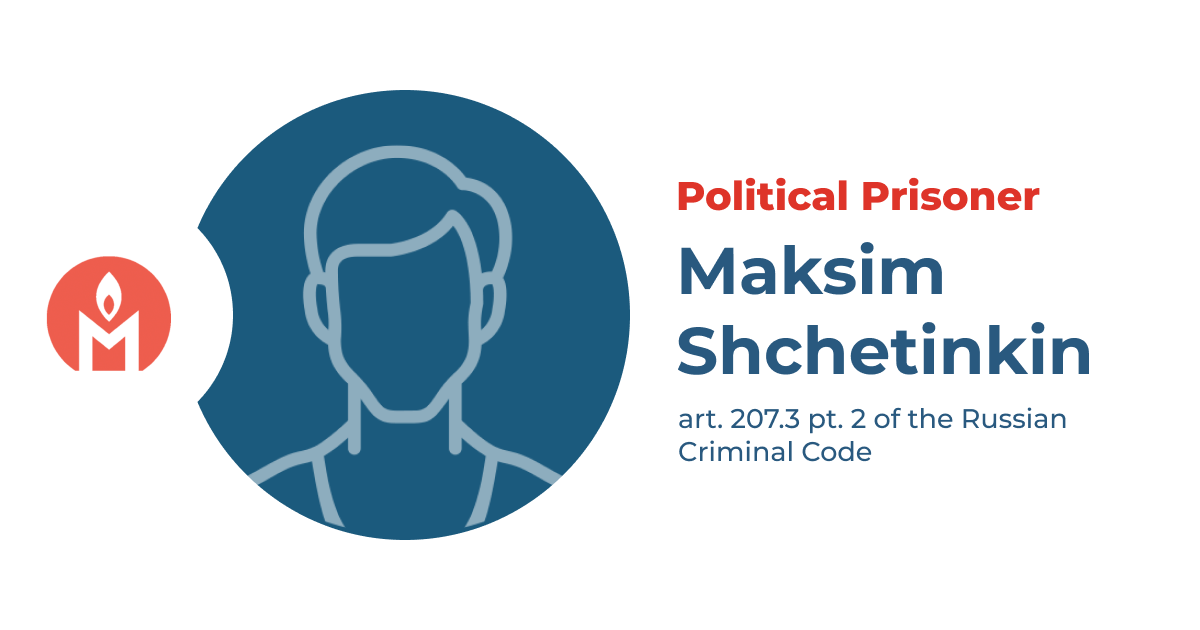Maksim Shchetinkin is a political prisoner
He has been charged with spreading ‘fake news’ about Russia’s army
The ‘Political Prisoners. Memorial’ human rights project, in accordance with international standards, considers Maksim Shchetinkin a political prisoner. Shchetinkin has been charged with spreading ‘fake news’ about the Russian army. Shchetinkin’s criminal prosecution has violated his rights to freedom of expression and fair trial. We demand the immediate release of Maksim Shchetinkin and that all criminal charges against him be dropped.

What are the charges against Maksim Shchetinkin?
Maksim Shchetinkin from Abakan in south Siberia has been charged with spreading ‘fake news’ about the Russian army on the grounds of political enmity or hatred with falsification of evidence for the prosecution (Article 207.3, Part 2, of the Russian Criminal Code).
Shchetinkin was detained on 28 June 2024. By September, his case was brought to trial. Shchetinkin faces up to 10 years’ imprisonment.
Why do we consider Shchetinkin a political prisoner?
The law on the ‘deliberate dissemination of information known to be false about the Russian army,’ the offence for which Shchetinkin is being prosecuted, was introduced into the Russian Criminal Code immediately after the start of Russia’s full-scale war against Ukraine. It effectively prohibits any criticism of the Russian authorities and military, in violation of the civil right of freedom of expression. This law contradicts the Russian Constitution, and therefore any prosecutions brought under it are unlawful.
This also applies to the prosecution of Shchetinkin although we do not know for what statements he has been prosecuted. Since he has been charged with “falsification of evidence for the prosecution,” we can assume that it is connected to some publications about war crimes of the Russian Armed Forces in the Ukrainian city of Bucha. Many bloggers and journalists have been prosecuted for such statements, and it is the evidence of these crimes that Russian officials have repeatedly called “falsified” and “staged.”
In this case, the accusation of spreading knowingly false information is especially absurd, since the mass murders and other crimes committed in February and March 2022 in Bucha were recorded and analysed in detail by independent experts, and responsibility for them lies precisely with the Russian military.
However, even if Shchetinkin’s publication was not about Bucha, but about other war crimes or unrelated aspects of the war, we believe that disseminating such information is not a crime, but a socially beneficial act.
A detailed description of Maksim Shchetinkin’s case and of our position is available on our website.
Recognition of an individual as a political prisoner does not imply the ‘Political Prisoners. Memorial’ human right project agrees with, or approves, their views, statements, or actions.
How can you help?
You can write to Maksim Shchetinkin at the following address:
In Russian: 655017, Республика Хакасия, г. Абакан, кв. Молодёжный, д. 22Б, ФКУ СИЗО-1 УФСИН России по Республике Хакасия, Щетинкину Максиму Михайловичу 1979 г.
In English: Shchetinkin Maksim Mikhailovich (born 1979), Pre-Trial Detention Centre No. 1 of the Federal Penitentiary Service in the Republic of Khakassia, 22 B, Molodyozhny quarter, Abakan, Republic of Khakassia, 655017, Russia.
Please note that letters in languages other than Russian are highly unlikely to reach the recipient
You can send an email via F-Pismo, ZT (for payment with Russian bank cards), PrisonMail (for payment with other bank cards), or OVD-Info (free of charge).
You can donate to support all political prisoners in Russia.
